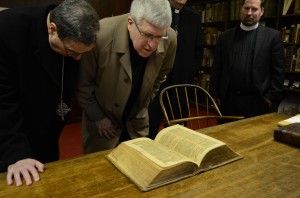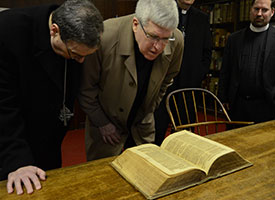By Pamela J. Nielsen
In the week preceding the U.S. Supreme Court’s hearing of oral arguments challenging the biblical definition of marriage, a group of religious leaders met to discuss their commitment to caring for those in need while remaining faithful to biblical teachings regarding life, marriage and human sexuality. The meetings — March 21 in St. Louis — provided an opportunity for those present to become acquainted and informed about the social-ministry efforts of each church body represented, in the midst of increased governmental intrusions on religious liberty.

The meetings were organized by the International Lutheran Council (ILC), represented by the Rev. Dr. Robert Bugbee, its vice-chairman and president of Lutheran Church—Canada, and the Rev. Dr. Albert Collver III, executive secretary of the ILC and director of Church Relations for the LCMS. Also participating were the Rev. Dr. Joel Lehenbauer and the Rev. Larry Vogel of the LCMS Commission on Theology and Church Relations, and the Rev. John Crossin, OSFS, executive director of the Secretariat for Ecumenical and Interreligious Affairs of the United States Conference of Catholic Bishops.
Explaining the Synod’s network of 171 Recognized Service Organizations (RSOs) were the Rev. Bart Day, executive director of the Office of National Mission, and Deaconess Dorothy Krans, RSO director.
Of the 117 RSOs that are social-service agencies, those providing adoption services and eldercare face challenges by state laws sympathetic to gay, lesbian, bisexual and transgender (LGBT) agendas, according to Krans. In some states, like Illinois, she said, “if an RSO can’t or won’t place a child into a LGBT home, they will lose all state and federal funds.” And organizations that provide eldercare, she added, are being pressed to provide LGBT signage in their facilities in states such as Florida.
Addressing the way in which the government and the media expect the Roman Catholic Church to be the sole protester when state and federal laws go against church teachings, Crossin explained that often government leaders and news outlets will pay more attention when other like-minded church bodies speak out, working together in the public square. He stressed the importance of such cooperation especially on the local level, citing a situation in Massachusetts, where a law making euthanasia legal was defeated because the archbishop of the Orthodox Church publicly took the lead and spoke against the law.
Lutheran Church—Canada’s Bugbee related the challenge to church groups in Canada who rent out their facilities but choose not to rent to LGBT groups in keeping with their profession of faith. One religious leader, who openly opposed the law requiring churches to rent to all or none, experienced death threats, he said.
The group discussed the rapid change in public opinion on matters of sexuality and how society seems to have lost its way. What is the Church to do?, they asked. What is her role in a culture that seems no longer Christian in any measurable way?
Ideas about ways to work together in an effort to provide useful resources for church leaders and parish pastors were discussed. Significant to the discussion was the recognition by the participants that the church must not only condemn sin, but also reach out in love to those caught in sin, especially those sins that our modern culture has deemed acceptable behavior.
The question of how the Church will re-engage her members who no longer practice the faith was addressed by Crossin, who said, “Let’s engage people where they are, agnostic or lapsed. You do have to commit to walk with people, the fallen away, the agnostics. It’s not a one-time thing. We don’t want to hear that it’s a long-term engagement to help bring people back in the fold.”
“We’re building relationships, not separating. I’m here for this purpose,” said Crossin, who noted that the United States Conference of Catholic Bishops (USCCB) has a relationship with the Evangelical Lutheran Church in America (ELCA) and other Lutheran groups. Crossin acknowledged the significant doctrinal differences between the LCMS, the ELCA and the Roman Catholic Church while affirming the commitment to biblical teachings on the sanctity of life, matrimony and sexual orientation shared between the LCMS and his church body.
“We never expect you to be anything other than who you are,” offered LCMS President Rev. Dr. Matthew. C. Harrison, who briefly met with the group and thanked Crossin for the lead the USCCB has taken in speaking out boldly in the public square. Harrison noted that his own personal conviction to the Holy Scriptures and the Lutheran Confessions are clarified and further solidified with each opportunity he has to meet with the theologians and leaders of other religious groups.
Following lunch, the group visited Concordia Seminary, St. Louis, where they were hosted by President Rev. Dr. Dale Meyer, who gave them a tour of the campus and led a social hour with several faculty members. The seminary tour included a visit to the library’s rare-book room, where the personal Bible of J.S. Bach was displayed in honor of the 328th anniversary of his birth on March 21.
Deaconess Pamela J. Nielsen is associate executive director of LCMS Communications.
